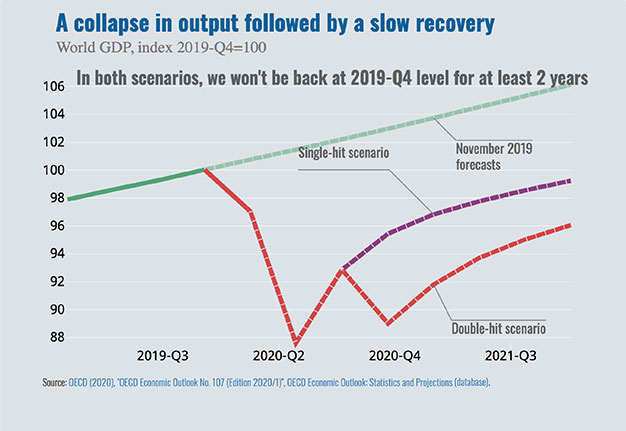Britain’s economy is likely to suffer the worst damage from the Covid-19 crisis of any country in the developed world, according to a report by Organisation for Economic Co-operation and Development out this morning.
In a devastating report,the OECD say that The COVID-19 pandemic is a global health crisis without precedent in living memory. It has triggered the most severe economic recession in nearly a century and is causing enormous damage to people’s health, jobs and well-being.
The lockdown measures brought in by most governments have succeeded in slowing the spread of the virus and in reducing the death toll but they have also frozen business activity in many sectors, widened inequality, disrupted education and undermined confidence in the future.
As restrictions begin to be eased, the path to economic recovery remains highly uncertain and vulnerable to a second wave of infections.With or without a second outbreak, the consequences will be severe and long-lasting.
The forecast says that without a second wave,Global economic activity falls 6% in 2020 and OECD unemployment climbs to 9.2% from 5.4% in 2019.Living standards fall less sharply than with a second wave but five years of income growth is lost across the economy by 2021.
A second wave they say will see World economic output plummets 7.6% this year, before climbing back 2.8% in 2021.The OECD unemployment rate nearly doubles to 10% with little recovery in jobs by 2021.
Euro area GDP is expected to plunge by 11½% this year if a second wave breaks out, and by over 9% even if a second hit is avoided, while GDP in the United States will take a hit of 8.5% and 7.3% respectively, and Japan 7.3% and 6%. Emerging economies such as Brazil, Russia and South Africa, meanwhile, face particular challenges of strained health systems, adding to the difficulties caused by a collapse in commodity prices, and their economies plunging by 9.1%, 10%, and 8.2% respectively in case of a double hit scenario, and 7.4%, 8% and 7.5% in case of a single hit. China’s and India’s GDPs will be relatively less affected, with a decrease of 3.7% and 7.3% respectively in case of a double hit and 2.6% and 3.7% in case of a single hit.
In either scenario, Britain will fare a lot worse than its rivals in the developed world.
UK’s national income will see a fall of 11.5% during 2020 whereas Germany’s decline will be 6.6% this year while Spain’s GDP will fall by 11.1%, Italy’s by 11.3 and France’s by 11.4%.
Speaking ahead of a special OECD Roundtable Ministerial Meeting chaired by Spain’s Vice-President of the Government and Minister for Economic Affairs and Digital Transformation Nadia Calviño, to discuss policy responses to the pandemic, OECD Secretary-General Angel Gurría said: “Uncertainty is clearly extreme in the current context, but the implications of that for macroeconomic policies are not symmetric. Policy-makers were right not to be too slow to introduce emergency measures, and they should now guard against being too quick to withdraw them”.
“How governments act today will shape the post-Covid world for years to come,” he added. “This is true not only domestically, where the right policies can foster a resilient, inclusive and sustainable recovery, but also in terms of how countries co-operate to tackle global challenges together. International co-operation, a weak point so far in the policy response, can create confidence and have important positive spillover effects.”
Presenting the Outlook, OECD Chief Economist Laurence Boone said: “Extraordinary policies will be needed to walk the tightrope towards recovery. Restarting economic activity while avoiding a second outbreak requires flexible and agile policymaking.” She said the safety nets and support currently provided for badly hit sectors would need to be adapted to help businesses and workers move to new activities.
“Higher public debt cannot be avoided, but debt-financed spending should be well-targeted to support the most vulnerable and provide the investment needed for a transition to a more resilient and sustainable economy,” she said.
“Governments must seize this opportunity to build a fairer economy, making competition and regulation smarter, modernising taxes, government spending and social protection,” she added. “Prosperity comes from dialogue and co-operation. This holds true at the national and global level.”
The Outlook calls for stronger international co-operation to help end the pandemic more quickly, speed up the economic recovery, and avoid harming the catch-up process of emerging-market economies and developing countries. It also argues for encouraging more resilient supply chains, including larger holdings of stocks and more diversification of sources locally and internationally.







